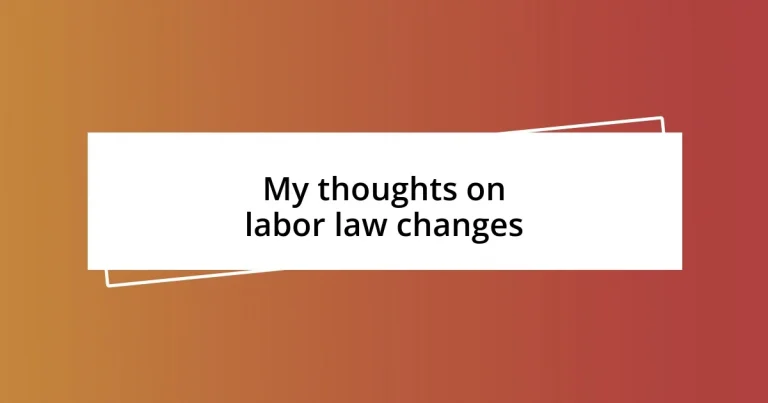Key takeaways:
- Understanding labor law changes is vital for both employees and employers, fostering a culture of respect and support in the workplace.
- Recent labor law changes have led to enhanced worker protections, increased minimum wages, and expanded rights for gig workers, positively impacting employee morale and well-being.
- Future labor legislation trends are anticipated to focus on equity, mental health support, and pay transparency, reflecting evolving workforce needs.
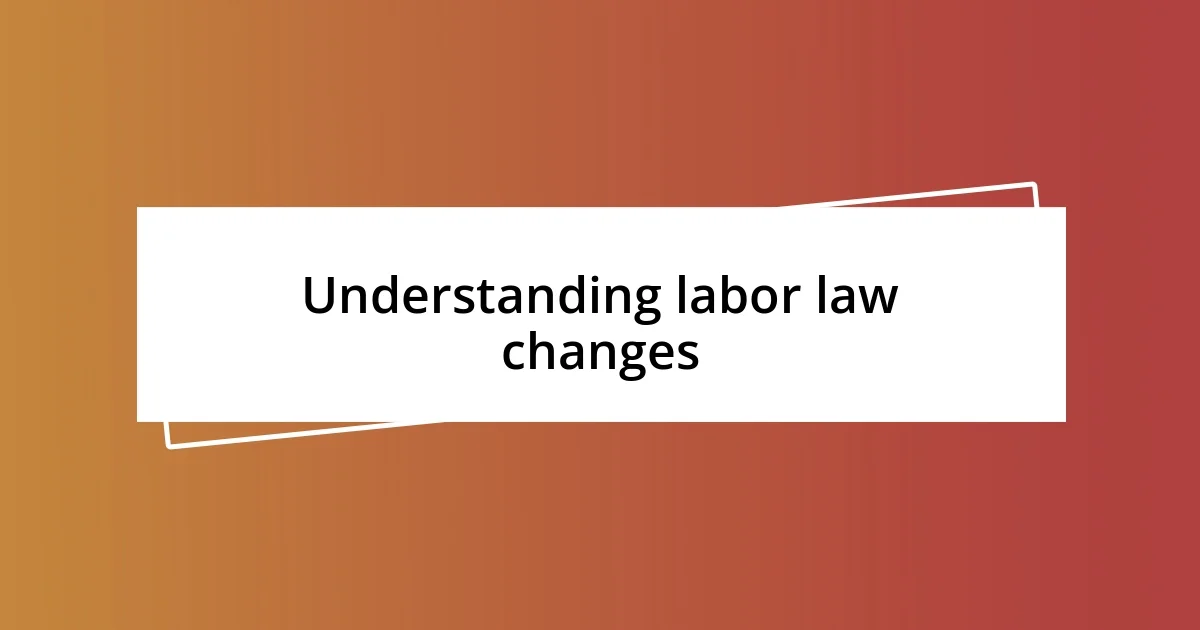
Understanding labor law changes
Understanding labor law changes is crucial for both employees and employers. When I first entered the workforce, I remember being overwhelmed by how much I didn’t know about my rights. Were there protectors in place for workers like me? I quickly realized that labor laws evolve to meet the changing dynamics of work environments and employee needs.
With each new regulation or amendment, there can be confusion about what it truly means for daily operations. I once had a manager who struggled to adapt to a new law concerning overtime. It made me wonder how often businesses overlook key changes that could benefit their employees. The reality is that staying informed isn’t just about compliance; it’s about fostering a culture of respect and support.
Moreover, understanding these changes can empower individuals to advocate for themselves and their colleagues. In my experience, during a roundtable discussion on recent updates, someone boldly voiced their concerns, leading to immediate changes in our workplace policies. How often do we pass up the opportunity to initiate important conversations? Ultimately, being engaged with labor law changes not only enhances job satisfaction but also builds stronger relationships in the workplace.
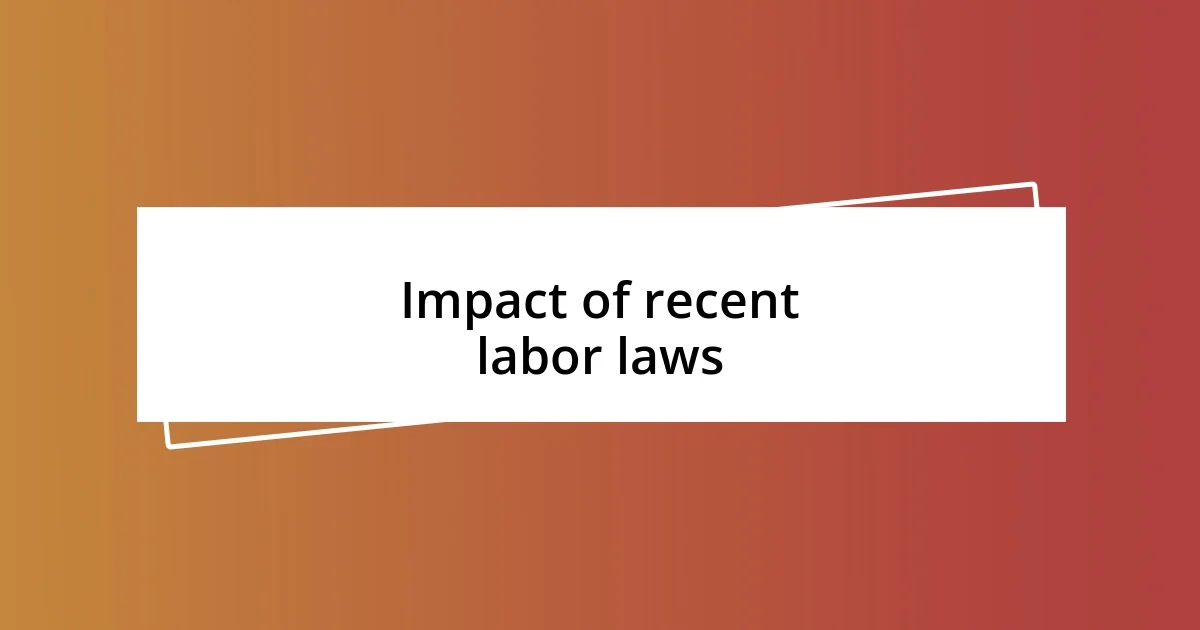
Impact of recent labor laws
The recent changes in labor laws have profoundly impacted workplaces across the country, shifting the balance between employee rights and employer responsibilities. I recall a time when my friend’s company implemented new safety regulations after a series of accidents; they not only complied with the law but also saw increased morale among the staff. This change made it clear to me that adherence to labor laws often leads to better work environments, where employees feel valued and secure.
Key impacts of recent labor laws include:
- Enhanced worker protections against discrimination and harassment.
- Increased minimum wage laws, which can lift families out of poverty.
- Greater access to paid family leave, supporting work-life balance.
- Strengthened regulations on workplace safety, reducing accidents and injuries.
- Expanded rights for gig workers, recognizing their contributions to the economy.
In witnessing these changes, I noticed a newfound confidence among my peers to voice their opinions, reflecting an evolving workplace culture where collaboration is encouraged. The emotional weight of understanding one’s rights can be transformative; it inspires a sense of community and empowers everyone to advocate for a better work environment.
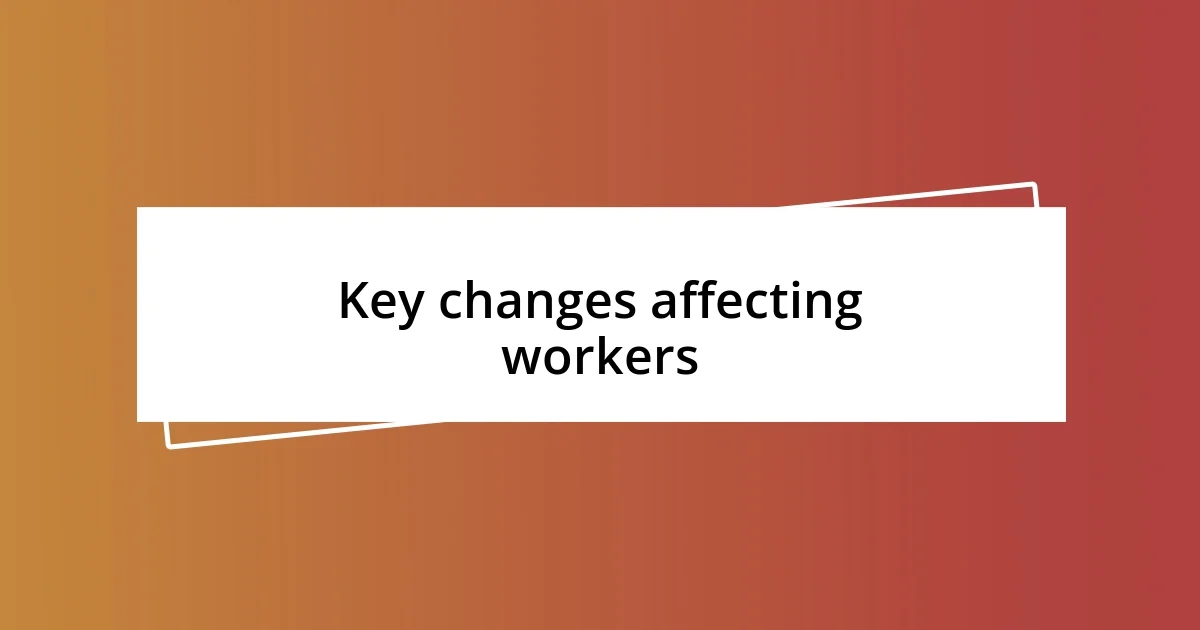
Key changes affecting workers
The latest labor law changes have introduced significant benefits for workers, particularly in the area of workplace safety. I remember attending a safety training session where our updated protocols were shared. It was eye-opening to hear firsthand how these adjustments were not only about compliance but about genuinely caring for employee well-being. This distinct shift towards safety-first cultures has made me feel more secure and valued as a team member.
Changes in minimum wage laws have also had a noticeable impact, especially for many of my friends who juggle multiple jobs. One of them recently shared how an increase in pay allowed her to finally cut back on extra hours, enabling her to spend precious time with her family. It highlighted for me how fiscal changes translate into lifestyle improvements, ultimately enabling workers to thrive personally and professionally.
The expansion of rights for gig workers is another critical development. I recall a conversation with a freelance designer who expressed relief at finally receiving access to basic benefits previously denied to workers in her position. This shift not only recognizes the hard work of gig employees but also creates a more inclusive economy, allowing everyone to contribute to their fullest potential. It’s refreshing to see such progress, and it makes me wonder about the future of work as more people gain these vital protections.
| Key Changes | Description |
|---|---|
| Worker Protections | Stronger protections against discrimination and harassment. |
| Minimum Wage Increases | Higher wages to support families and boost purchasing power. |
| Paid Family Leave | Improvements to work-life balance through extended paid leave. |
| Workplace Safety | Enhanced regulations for safer work environments. |
| Gig Worker Rights | Expanded access to benefits for gig economy participants. |
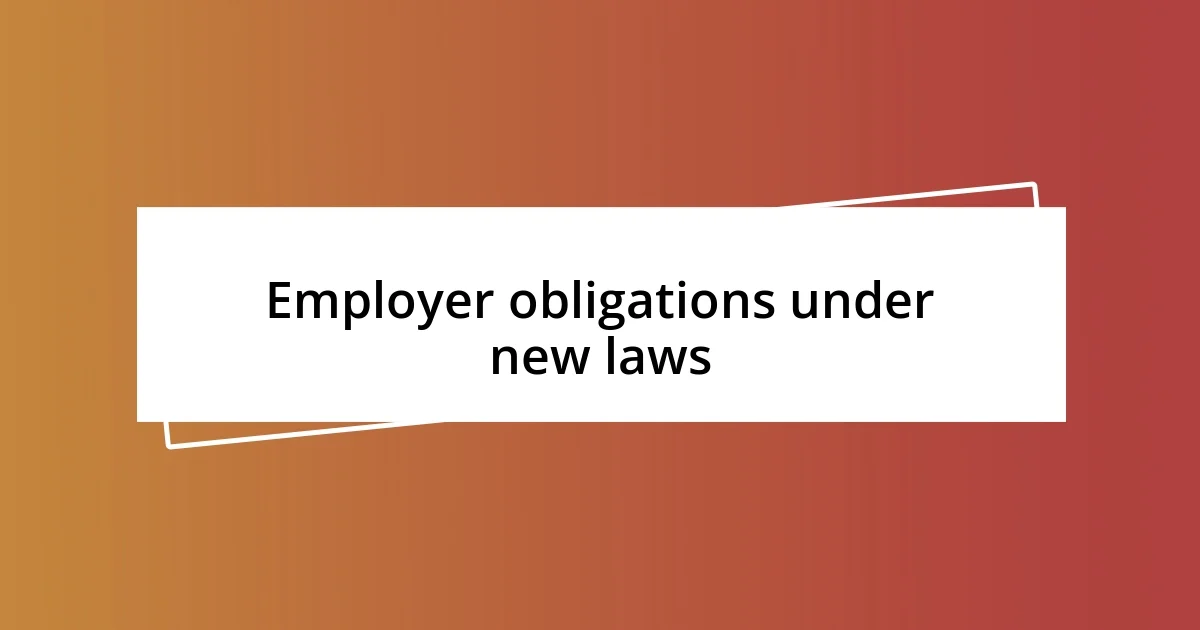
Employer obligations under new laws
Employer obligations under the new labor laws require a shift in mindset, not just compliance. I recall a time when my old office underwent policy changes for safety measures; it initially felt overwhelming, but when I saw my manager actively engaging with the new protocols, it created an atmosphere of shared responsibility. It made me realize that when employers invest in understanding and implementing new laws, it fosters trust and confidence among staff.
Now, with enhanced protections against discrimination and increased access to paid family leave, employers must ensure their training and resources are up-to-date. I once attended a workshop designed to educate my company’s leadership about these changes. It was eye-opening to see how much more effective workplaces can become when everyone is on the same page regarding their obligations. This commitment not only meets legal requirements but enhances overall workplace harmony.
The responsibility to uphold these obligations may seem daunting at first, but I believe it can lead to remarkable transformations in company culture. Can you imagine a workplace where everyone feels safe to voice their concerns and happy to contribute? When employers prioritize these legal duties, they not only comply with the law but also cultivate an environment where employees thrive both personally and professionally. This symbiotic relationship can truly change a company’s fabric for the better.
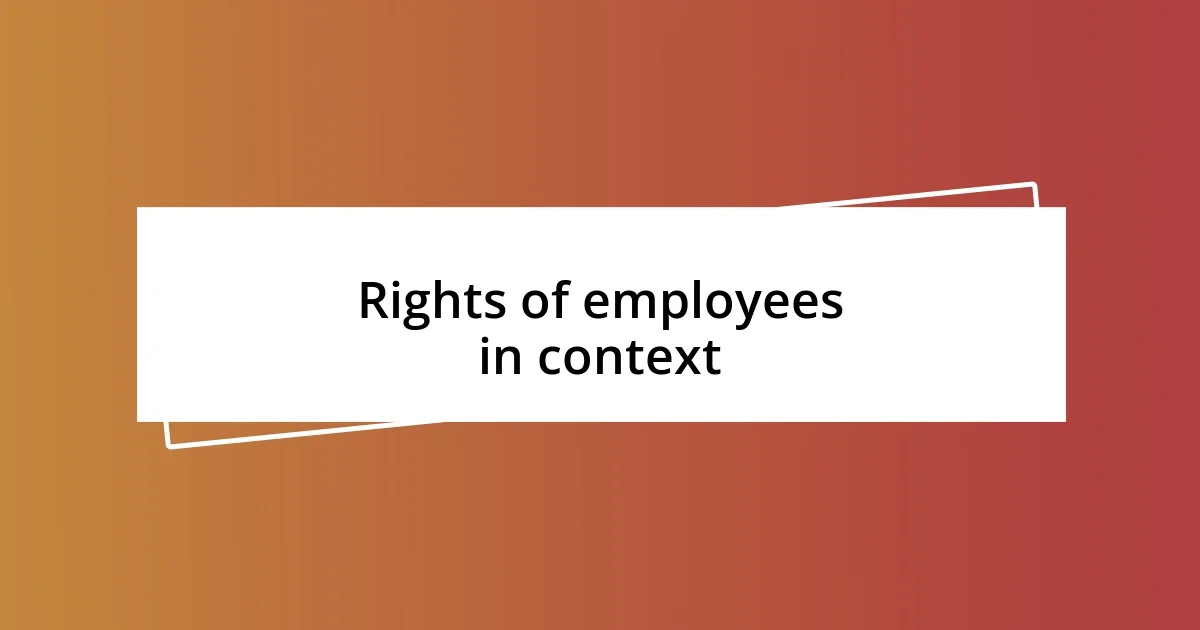
Rights of employees in context
The rights of employees are often intricately woven into the fabric of workplace culture. I remember feeling a wave of relief the first time I learned about our enhanced rights against harassment. It was a pivotal moment, revealing that my employer not only acknowledged the challenges employees face but was also committed to fostering a safe and respectful environment. Isn’t it empowering to know that we have a voice and that our concerns can lead to policy changes?
Beyond safety, the adjustment to paid family leave resonates deeply with many. I think back to a colleague who, after the new legislation passed, was able to take time off when her father fell ill. This change didn’t just provide her the necessary time to care for her family; it showed me how laws could transform lives on a personal level. Does it not make you reflect on how much better mental well-being can flourish when personal responsibilities can be addressed without fear of losing income?
Additionally, the rights granted to gig workers mark a significant evolution in how we view work. A friend of mine, a part-time gig worker, once shared how the newfound access to health benefits changed her outlook on freelance work. Instead of feeling precarious about her financial security, she now approaches her tasks with enthusiasm and stability. It’s remarkable to see this shift, making me ponder: what other changes might lay ahead as society recognizes the contributions of all types of workers? It’s a journey, but one that feels increasingly hopeful.
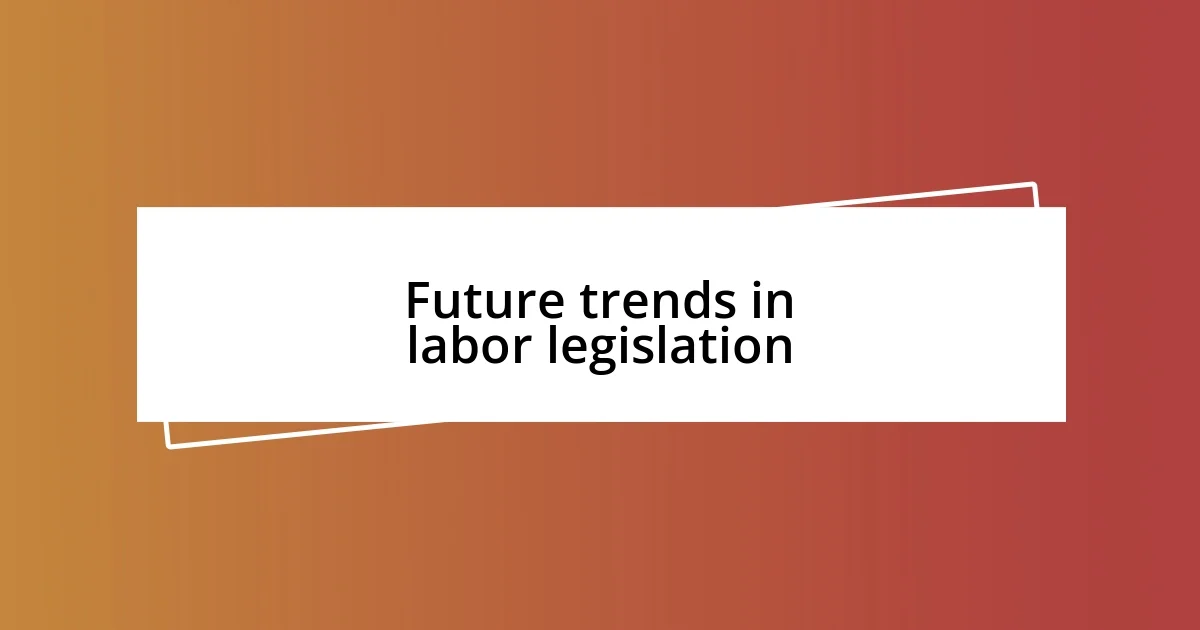
Future trends in labor legislation
As I look to the future, it’s clear that labor legislation will continue to evolve in response to societal demands for equity and fairness. I remember a conversation with a friend who works in HR; we speculated about how remote work policies might become more formalized. The rapid shift towards remote work during the pandemic exposed gaps in existing legislation, such as addressing employee rights in non-traditional settings. Doesn’t it make you wonder what protections will be put in place to ensure that all workers, regardless of location, have their rights upheld?
Moreover, I’m particularly intrigued by the growing emphasis on mental health and well-being in workplace legislation. I recall participating in a mental health seminar at my workplace, where the discussion centered around potential new regulations that promote mental wellness. It was enlightening and eye-opening; it occurred to me that legislating mental health support could revolutionize how we view employee wellness. Can you imagine a future where mental health days become a standard practice rather than a taboo topic?
Finally, I foresee a trend towards enhanced transparency around pay equity as just one facet of a broader movement against systemic inequalities. I once attended a workshop where we analyzed the disparities in pay within my field, and it struck me how crucial it is for legislation to support fair compensation. With discussions on salary transparency gaining traction, it feels like we are on the brink of a much-needed change. Wouldn’t it be refreshing to search for jobs knowing that pay equity is a mandatory disclosure rather than a guessing game?












